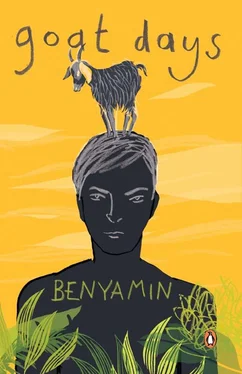Like two defeated men, Hameed and I stood for a while in front of the small police station at Batha. Two policemen were sitting in the sentry box near the gate. One was reading something. His posture, the way he moved his head, and his half-closed eyes, suggested that it was a religious text. The second policeman was on the telephone. His laughter and chatter audible in the street. Although the two sat close to each other, they were in different worlds. Neither worlds cared for us.
Slightly off the sentry box, a wild lemon tree curved into the street. We squatted in its shade, hoping a guard would look up from his work and notice us. We remained like that for a long time. Meanwhile, one or two Arabs briskly went into the police station and at least three or four sauntered out. It was as if we were invisible to them. Then a police vehicle came out of the station compound. We jumped up, eagerly following it with our eyes. But, stopping only to watch for vehicles on either side of the main street, it went its way. Feeling desperate, we leaned against the tree.
Whenever we thought the guard on the phone had ended his call, we would anxiously rise and walk up to the sentry box. It was futile though, for he would make another call without losing even a moment. The other sentry was so immersed in his reading that there was no sign he would look up any time soon.
We even walked past the sentry box a couple of times just to draw their attention. However, they did not notice us.
Haven’t we all heard about so many unfortunate people who, for some emergency, left their rooms without the pathaka and got arrested in the market, in public places or in front of mosques. How many days did we walk through the vegetable market, the fish market and busy streets hoping to get arrested? Many a muthawwa went past us, not one stopped us. Many a policeman came across us, none checked us. What’s more, we even loitered near mosques during prayer times without going in to pray. We tried it at several mosques and during different parts of the day. Still no one noticed us. One day, I even deliberately tripped on a policeman’s foot. Instead of questioning me, he lifted me up, apologized profusely in the name of Allah and sent me away. Why is it that even misfortune hesitates to visit us when we need it desperately?
Finally, seeing no other way, we chose to come and stand in front of the police station; still, no use. After a while, we decided to cross the sentries and walk into the station. As soon as the suggestion came from Hameed, I got up and started walking, as if I had been waiting to hear it. I couldn’t wait any longer. As we went past the long iron crossbar, the sentry who was reading raised his eyes and called us. We went back to the sentry box and said we wanted to see the mudeer . Gesturing us to proceed, he went back to his book.
We stepped into the police station and climbed up a long flight of steps, walking past doors bearing large inscriptions of verses from the Quran. Under a notice board in which papers were pinned like decoration, we spotted some policemen sitting and eating khubus and drinking kahwa , talking noisily. We stood quietly in front of the counter. On seeing us, one of them broke away from the conversation and raised his eyebrows while he continued to eat.
I gestured with my hand to show that I didn’t know the language. Another policeman, with a kahwa cup in his hand, rose from his seat, came towards us and asked us for our pathakas. Yes, finally, someone asked the question! We helplessly shook our heads to say we didn’t have it. He placed the kahwa cup on the table, opened the drawer, took a tissue paper and wiped his hands and lips. Then walking inside, he signalled us to follow him.
He took us to the room of the mudeer who looked up from the computer screen when he saw us enter. The policeman who escorted us told the mudeer something and he asked us something. We didn’t betray any signs of understanding. I did not have to pretend; I really didn’t understand most of what the policeman said or what the mudeer asked. But Hameed had to put on an act. I had heard him speaking fluent Arabic. Again, the mudeer and the policeman talked about something. Meanwhile, I scanned his room. It was a large office. On the walls were verses from the Quran, portraits of kings and a picture of the Kaaba. On the left from where the mudeer was sitting was a TV and on his right, a computer. A little further away, a sofa and a teapoy. On the teapoy was a flower vase with some plastic flowers. The wall opposite had a board with some photos pinned on it. I gazed at those photos. Bearded people with dead-fish eyes, Blacks in Arab dress. The Arabic lettering beneath each must have been their names. When I reached the third photo in the fourth row, my eyes froze like polar ice. I shook my head and looked at it again carefully. My heart began to pound and a sudden panic gripped me. Without realizing what I was doing, I began to walk towards the board on which the photo was stuck. Ibrahim Khadiri! I placed my hand on my heart.
‘What? Do you know him?’ the policeman asked me. I felt panic-stricken. The change in my manner was obvious. Still, I shook my head in a no. The mudeer called me and when I went up to him, he jumped up and slapped me across my ear. Oh! Only I remember how pain steamed out through the other ear. ‘If you don’t know him, why did you go to look at the photo?’ the mudeer bellowed. I stood with my head bowed. He asked me something else in Arabic. I didn’t answer. Finally, after cracking another slap, he sank back into his chair. I didn’t cry. But Hameed did, so he didn’t get slapped. The mudeer gave the policeman some instructions. We were taken to another room and handed over to another policeman. He opened a cabinet, took out handcuffs and put them on us, after which he made us sit on a bench.
Like us, the four or five others there were also in handcuffs. I doubt if any of them were as happy to be arrested as we were. In the afternoon, the cuffs were removed and we were put in a cell. Six people occupied the cell that could hardly accommodate three. I recall a Malayali named Kumar among them. He had been working in a vegetable shop and was arrested because his Arab had accused him of theft. As for the two Arabs and the Pakistani in our cell, I don’t know what crimes they had been charged with.
None of us could sleep that night, as we sat packed together like we were in an overcrowded train compartment. And with the Arabs spreading their legs comfortably, others had to suffer even more. Still, compared to what I had endured, that narrow cell was heaven to me.
The next morning, after tea, we were handcuffed again and taken out in a vehicle. There were other handcuffed people in that vehicle who tried to get acquainted with one another. Even among them, Hameed and I remained silent and kept our heads bowed.
After a long journey, the vehicle stopped inside the compound of the largest prison in the country, Sumesi. Many vehicles from different corners of the country entered the prison yard at various times; from each, hundreds of ‘criminals’ came out. Absurd as it sounds, this scene reminded me of the marriage halls back home — the prisoners resembled the groom’s tired relatives milling about the venue. Now I had become one such relative!
Once out of the vehicle, we were taken to the warden’s office. It was very busy there. Many policemen came and went. Lawyers came and went. Muthawwas came and went. Arabs, too, came and went. At a glance, it reminded me of the porticos of our courts. There was quite a long queue in front of the warden’s office and we took our place at the end. The policemen who came with us sat down in the shade of the veranda, a short distance away from the queue. We inched ahead as each person was called inside. I knew that the line was slowly taking us into the prison, and I was anxious about what awaited me inside. But I was also quite excited, almost like someone standing in front of the polling station to cast one’s ballot for the first time. Slyly, I muttered my thoughts to Hameed.
Читать дальше




![Джон Харгрейв - Mind Hacking [How to Change Your Mind for Good in 21 Days]](/books/404192/dzhon-hargrejv-mind-hacking-how-to-change-your-min-thumb.webp)







